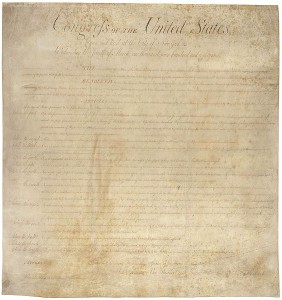I blogged about copyrights awhile back, but this topic is a little different. Today’s discussion is about your rights to your story.
No, the U.S. Constitution’s Bill of Rights is not where you go to find out about them. Your story rights are embodied in the laws of the country you live in, and by agreement with the country where your publisher is.
How do rights differ from copyrights? The copyright (©) to your written story is something you own and always retain. Think of the copyright as a bundle or collection of individual rights. If you want your story published or distributed by someone else (the usual case), then you’ll likely end up agreeing by contract to transfer part of that bundle of rights, usually in exchange for payment to you. But you always keep the copyright.
Rights are exclusive in nature, meaning you are granting one, and only one, publisher the right to print and distribute your work. No other publisher may do so legally. Also, since you are selling your rights to a single publisher, you are prohibited from selling those same rights to another publisher. This exclusivity is the normal case, but some contracts may specify nonexclusive rights.
There are three aspects to rights: media, term, and territory.
- Media means the form of publication, for example hardcover, paperback, e-book, audiobook, podcast, serialized, etc. The contract should specify the payment type and amount for each of the different media types cited in the contract. You retain the rights to any types not cited.
- Term refers to the time period for which you’re granting rights to the publisher, usually expressed in years after the date of the contract. After that time, the specified rights revert to you, and you may then sell them to someone else if you wish.
- Territory is the geographic region in which the publisher may exercise these rights.
There are two categories of rights:
- Primary Rights, or just Rights. When the publishing company buys your rights, they have certain media immediately in mind that they intend to exercise. Maybe they want to publish your work in hardcover now, and paperback later. These uses of your work are the subject of the primary rights.
- Subsidiary (or Secondary) Rights. The publisher has no immediate intent to exercise subsidiary rights, but would like to buy them from you now to allow later use. These often include movie and TV rights, merchandizing rights, dramatic and performance rights.
You’ll encounter some other terminology with respect to story rights. These definitions assume you’ve sold the specified right to a publisher.
- First Rights: The publisher can publish your story for the first time anywhere and in any format
- Second (Reprint) Rights: The publisher can publish your story following a first publication elsewhere.
- One-Time Rights: The publisher can publish your work once.
- First Serial Rights: The publisher can publish your story for the first time, and may do so all at once or a piece at a time in a periodical publication.
- Second Serial Rights: After initial publication, the publisher can publish excerpts of your story in several magazines or newspapers.
If you’re offered a publishing contract, read the Rights section with care. Look up unfamiliar legal verbiage or ask someone with contracting expertise. You can negotiate with publishers and get them to change the contract before you sign; contracts are mutual agreements between two parties.
Here, here, and here, are some very good websites with more information about story rights.
I know what you’re wondering at this point, and the answer is no. After this exploration of story rights, there will not be a companion blog post on the subject of story lefts, written by—
Poseidon’s Scribe

